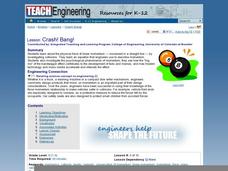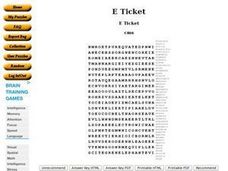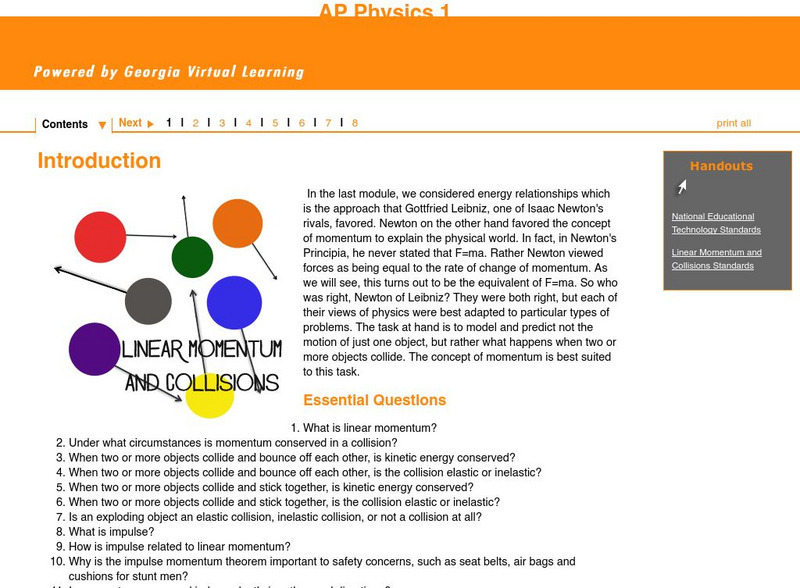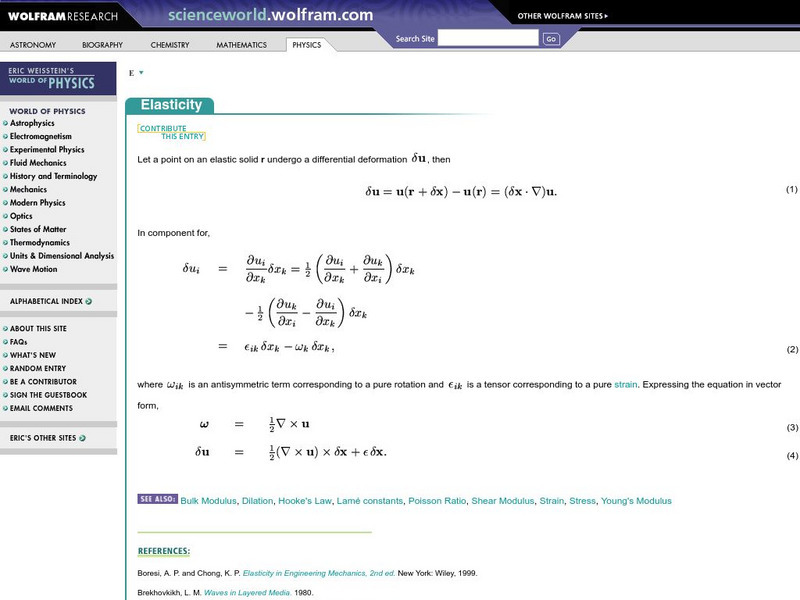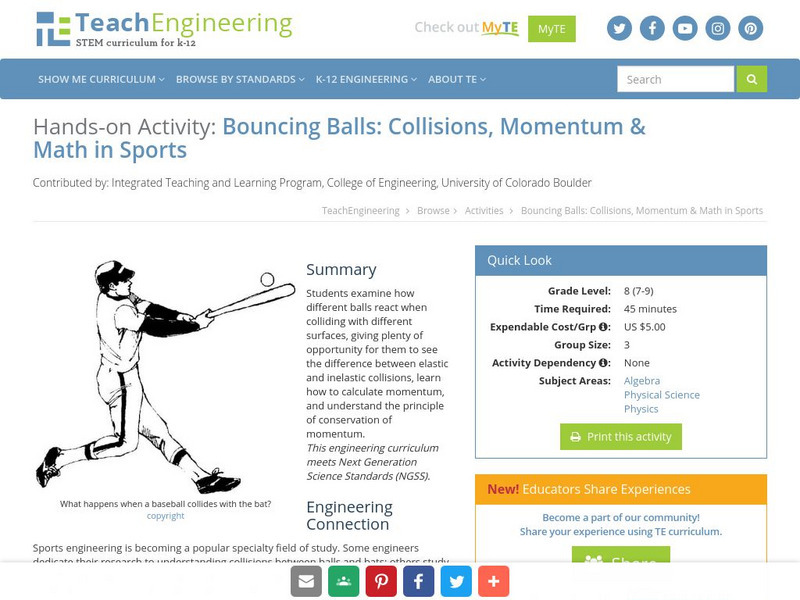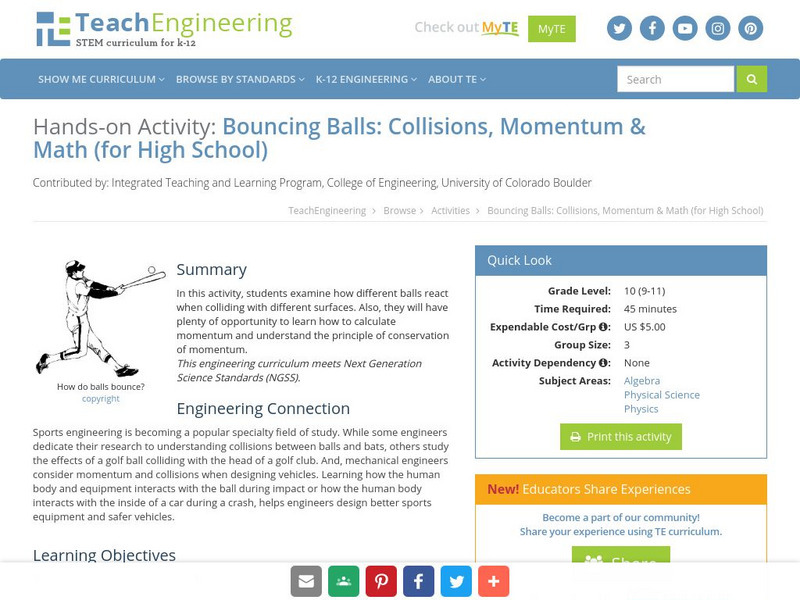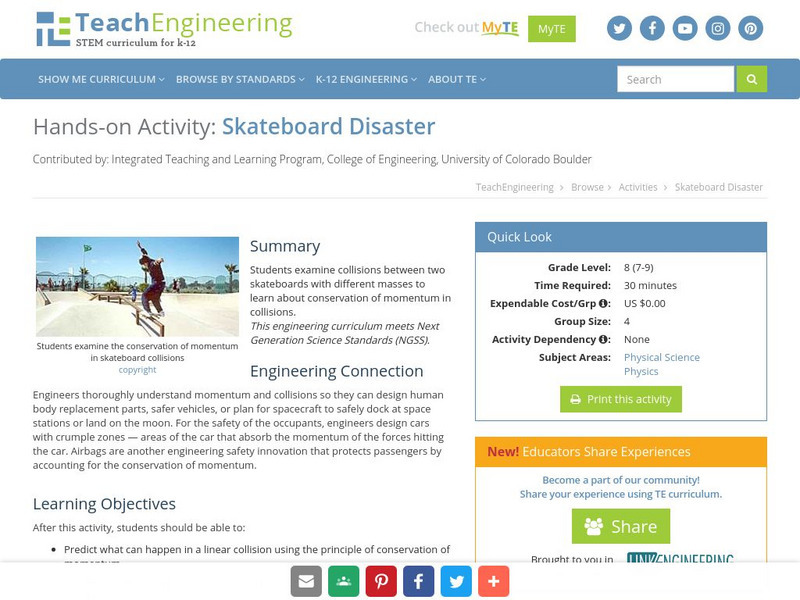Curated OER
Price Elasticity of Demand
A series of economic activities should keep your class busy for a while. Six different worksheets review the concepts of price elasticity, demand, and U.S. economics. Multiple real-world applications and scenarios house each of the ten...
Curated OER
Properties of Matter
In this properties of matter worksheet, students answer 11 questions about the various properties of matter such as density, elasticity, malleability, and how hard or brittle a substance is.
Curated OER
Crash! Bang!
Young scholars study the physical force of linear momentum by investigating collisions. They analyze the difference between elastic and inelastic collisions. They calculate linear momentum.
Curated OER
Collisions and Momentum: Bouncing Balls
Middle schoolers explore the concepts of potential and kinetic energy by bouncing assorted balls on different surfaces and calculating the momentum for each ball. They give examples of collisions and momentum in sports and understand...
Curated OER
TE Activity: Testing Fundamental Loads
Middle schoolers experiment with the five fundamental load types that can act on structures. They use foam insulation blocks to which they apply the forces and draw the fracture patterns. They determine the telltale marks of failure that...
Curated OER
E Ticket
For this grammar worksheet, students identify and locate vocabulary terms that all begin with the letter "E." There are 45 words beginning with "E" located in the word search.
Georgia State University
Georgia State University: Hyper Physics: Elastic Potential Energy
This site from Georgia State University Physics Department defines elastic potential energy and explains its origin. Provides an equation for computing elastic potential energy and an opportunity to practice solving problems with an...
CK-12 Foundation
Ck 12 Exploration Series: Simulations: Physics: Bow and Arrow
[Free Registration/Login Required] Find out about the physics involved in the sport of archery. Watch this animation, then experiment with your own bow and arrow to see how the data changes.
Science Buddies
Science Buddies: The Unconstrained Truth About Constrained Layer Damping
This science fair project shows you how to transform a noisy piece of metal into a sound-muffling constrained-layer damper. You will record the sound of a controlled impact on a piece of metal with a microphone, a computer, and some free...
Georgia Department of Education
Ga Virtual Learning: Ap Physics 1: Linear Momentum and Collisions
This physics tutorial aims to model and predict not the motion of just one object, but rather what happens when two or more objects collide. The concept of momentum will be the main focus of this module.
Georgia State University
Georgia State University: Hyper Physics: Potential Energy
This site from Georgia State University Physics Department defines and explains the concept of potential energy. Using equations and graphics to illustrate the idea, it discusses the many types of potential energy (gravitational,...
TeachEngineering
Teach Engineering: Energy of Motion
By taking a look at the energy of motion all around us, students learn about the types of energy and their characteristics. They first learn about the two simplest forms of mechanical energy: kinetic and potential energy, as illustrated...
CK-12 Foundation
Ck 12 Exploration Series: Simulations: Physics: Collisions
[Free Registration/Login Required] This sim explains the concept of elastic and inelastic collision using two bumper cars. A PDF worksheet and a video tutorial are also available. [3:40]
Wolfram Research
Wolfram Science World: Elasticity
Over 30 equations which define quantities which server as measurable parameters of an object's elasticity are given. Some equations are derived and the derivations are explained. Highly technical!
Savvas Learning
Prentice Hall: Elasticity and Fracture
From the Prentice Hall companion web site for the Giancoli Physics textbook. A series of interactive questions on the topic of elasticity and fracture. Questions 11 through 19 pertain to the stress-strain relationship for elastic...
Other
Fabric for Bachelors or How to Shop for Work Clothes
Really fun series of articles about how to pick good quality clothing that will last through the years. Provides tips on selecting fibers, caring for clothes, and proper fit.
Center of Science and Industry
Cosi Columbus: Catapult
Science experiment that demonstrates how energy is transferred. Includes full list of materials, procedures, and scientific explanation of how the tension in the catapult causes an object to travel far.
Museum of Science
Museum of Science and Industry: Online Science: Activities: Make a Comeback Can
Step-by-step instructions, with photos, of how to make a metal can come back when it is sent rolling away. The can uses both kinetic and potential energy to roll away and back.
TeachEngineering
Teach Engineering: Bouncing Balls
Students examine how different balls react when colliding with different surfaces, giving plenty of opportunity for them to see the difference between elastic and inelastic collisions, learn how to calculate momentum, and understand the...
TeachEngineering
Teach Engineering: Bouncing Balls (For High School)
In this activity, students examine how different balls react when colliding with different surfaces. Also, they will have plenty of opportunity to learn how to calculate momentum and understand the principle of conservation of momentum.
TeachEngineering
Teach Engineering: Testing Fundamental Loads
Students will conduct several simple lab activities to learn about the five fundamental load types that can act on structures: tension, compression, shear, bending, and torsion. In this activity, students break foam insulation blocks by...
Other
Siemens Science Day: Earth Science: Bounce
Students measure effects of elasticity by dropping rubber balls, graphing the height of the bounces, and making conclusions about the causes and effects of the bounces.
TeachEngineering
Teach Engineering: Skateboard Disaster
Students examine collisions between two skateboards with different masses to learn about conservation of momentum in collisions.
Physics Classroom
The Physics Classroom: Potential Energy
The concept of potential energy is explained along with the two forms of potential energy: elastic and gravitational. Discusses what gravitational potential energy is, explains the direct relationship between it and mass and height, and...




